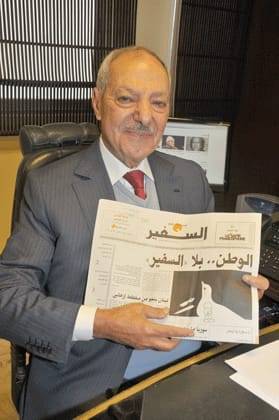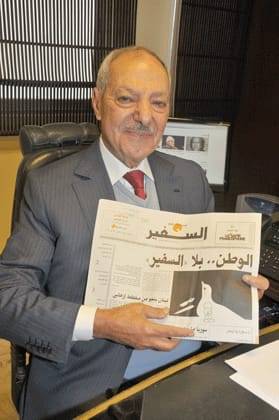On Friday, Lebanon and Arab journalism lost Talal Salman, the owner, editor-in-chief, and publisher of the Lebanese newspaper "As-Safir," which he led from March 1974 until its last issue on January 4, 2017. The newspaper carried the slogan "The newspaper of Lebanon in the Arab world and the newspaper of the Arab world in Lebanon," alongside another well-known slogan, "The voice of those who have no voice."
For decades, Talal Salman served as a respected media reference in Arab and Lebanese affairs, significantly influencing public opinion. His journalistic history is marked by numerous interviews with prominent Arab leaders, kings, and all Lebanese presidents. He survived an assassination attempt outside his home in the Hamra area of Beirut on July 14, 1984, suffering serious injuries. This was preceded by attempts to bomb his home and an actual bombing of "As-Safir's" press on November 1, 1980.
His career began in the late 1950s as a proofreader for "An-Nidal" newspaper, then as a journalist for "Asharq," after which he joined "Al-Hawadith" magazine as an editor. In the fall of 1962, he went to Kuwait to publish "Dunya Al-Arabiya" for "Dar Al-Rai Al-Aam," owned by Abdul Aziz Al-Masai'd. However, he returned after six months to work as the editorial director for "As-Sayyad" magazine and a writer for "Al-Hurriya" magazine until he dedicated himself to publishing "As-Safir."
"On the Road" was the title of Talal Salman's editorial pieces, and he created the character "Nesma," who accompanied him in the "Margins" section of the cultural supplement of "As-Safir." Salman was born in Shamsar (west of Baalbek in the Lebanese Bekaa) in 1938. His father was Ibrahim As'ad Salman, and his mother was Fahda Al-Attat. He married Iffaf Mahmoud Al-As'ad in 1967, from the town of Zrarieh in southern Lebanon. They had four children: Hanadi (managing editor at "As-Safir"), Rabia (general supervisor of the "As-Safir" archive), Ahmad (assistant general director), and Ali (sound engineer).
In his latest book, "Writing on the Wall of Journalism" (Dar Al-Farabi, 2012), he closely narrates his journey into journalism while also discussing the state of Lebanese journalism and its development into "modern Arab journalism." His arduous journey began in the late 1950s as "one of the graduates of Beirut, the capital of Arabism," starting as a proofreader for "An-Nidal," then as a journalist for "Al-Sharq," and then an editor and secretary of the editorial section at "Al-Hawadith." In the fall of 1962, he published the magazine "Dunya Al-Arabiya" in Kuwait, only to return to Beirut to work in "As-Sayyad" and "Al-Ahad" before finally dedicating himself to "As-Safir" in late 1973.
He had been a member of the Lebanese Press Syndicate since 1976 and was known for his deep conversations with most Arab leaders and officials. The public eagerly awaited his daily editorials titled "On the Road," which were distinguished by their political clarity and firm stance. They followed him with similar enthusiasm for "Nesma," the character he created in "Margins," who presented warm and emotional portraits of the political, cultural, and literary scenes while illustrating the sincerity of human feelings and its passion for life and high ethics.
As a journalist, he was characterized by a blend of keen political sensitivity and firmness in stance, which subjected him to increasing pressures that peaked during his escape from the assassination attempt on July 14, leaving scars on his face and chest. He had been a member of the Lebanese Press Syndicate since 2002, and he received the international award named after the Russian diplomat and orientalist Viktor Bosovaluk for the best journalistic coverage of events in the Middle East in 2000. In 2009, he was chosen by the Dubai Media Forum as "Media Personality of the Year." In 2010, the Faculty of Media at the Lebanese University awarded him an honorary doctorate in recognition of his role in journalism, media, and journalistic literature.
From January 2017 until 2022, Talal Salman continued to write "On the Road" on the website that bore and still bears his name: Talal Salman (https://talalsalman.com). The site also served as a platform for friends of "As-Safir" and Talal Salman from Lebanon and the Arab world, as well as the "As-Safir" page on the "X" (Twitter) platform.
Goodbye... How fast the years go, how slow the days are, how long the days are, how short the nights are. How harsh life is, how joyful existence is, how great freedom is, how low oppression, tyranny, submission, and surrender are.




